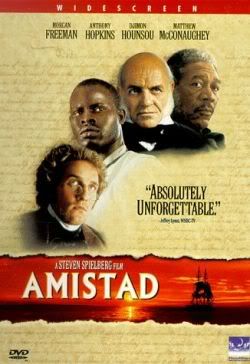28 February 2010
Amistad
Amistad is the story of a slave revolt involving some fifty people aboard the Spanish ship La Amistad, and their struggle to be seen as human beings after they are captured as they attempt to sail back to Africa. After breaking loose of their chains, a young African named Sengbe and his fellow ex-slaves commandeer the vessel in hopes of returning home, but stumble upon the US Navy and are brought to Connecticut to stand trial for murder and piracy. Three separate parties -- the Kingdom of Spain, the Spanish crew, and the two American naval officers who claimed to have salvaged the ship -- sue for ownership of the Amistad and its "cargo". The Amistad insurrectionists, unable to communicate with their American captors, are forced into a public cage while their fate is decided in the property courts.
A minor act of arbitration is brought to national prominence, however, when abolitionists seize the opportunity to attack the institution of slavery. Since US law decrees that only people born into the instution of slavery on a plantation can be considered slaves, the Amistad captives may go free if it is proven that they were captured in Africa, and not born into slavery. An ocean thus lies between their being defined as "men" or "slaves".
Southern politicans, dependent on the slave system, realize the acquittal of the prisoners may become a moral boon to the abolitionist cause. They thus bring all their resources to bear, including President Martin van Buren, who fears he may not be reelected if the southerners are not pleased with the outcome of the trial. Although the abolitionists are able to win in local and state legislatures despite the odds, the pro-slavery forces continue to manipulate the system to their own benefit. The battle is eventually taken to the Supreme Court: staffed almost wholly by southern politicians, it seems likely that the captives will be sent to Spain to be executed as murderers, or worse still be reduced to a life of slavery.
The beleaugered defender of the alleged slaves seeks counsel from the ailing John Quincy Adams. Aided by a young translator who allows the captives and Sengbe to tell the story of how they were stolen from their homes and shipped across the ocean in miserable conditions, the abolitionists and their supporters take on the highest court of the land and all of its prejudices. The essential theme of the movie is one of humanity -- are we human with rights only if the law acknowledges them, or are human rights more fundamental? Part of the film's interest for me is that it argues the latter while pretending to argue the former. We have rights as much as we are willing to declare them and fight for them.
The plot of this emotionally provactive courtroom drama contains both humor and tragedy, although more of the latter. Those sensitive to violence should be warned that the scenes depicting Sengbe and the others' treatment aboard the slave-ship is especially graphic. The acting was effective, as far as I noticed: Anthony Hopkins as John Quincy Adams and Djimon Hounsou as Sengbe are especially strong on the screen. I also enjoyed the movie's soundtrack, particularly the parts of it rooted in African sources. The film is not without its faults, although only one scene is truly objectionable. In this, Sengbe and an associate are seen examining an illustrated version of the Judeo-Christian bible and taking hope in the idea that Jesus will be there for them just as he was for the Jews. I found this unlikely, patronizing, and repugnant -- especially so given that Jesus never said a word against slavery, nor did the founder of his religion, Paul. Since the scene is not referenced again, nor is anything built upon it, it seems like an overly pious and fraudulent imposition. Overall, though, the movie's story gripped me.
The trailer is below.
===========================
A few years ago I contemplated sharing movies and books that might be of interest to a humanistically-minded audience -- movies that said something about the human condition, particularly about our ability to live life well in spite of circumstances. I have not found many movies that do this, but my intention to make this blog more broadly themed around the humanities widens the range of movies I might share. This is the first.
Labels:
movies
Subscribe to:
Post Comments (Atom)

2 comments:
A *very* good film. Thanks for the reminder.
Quite welcome. The main reason I watched the film was for Morgan Freeman, but -- ironically enough -- his character played a very minor role despite appearing in most scenes.
Post a Comment